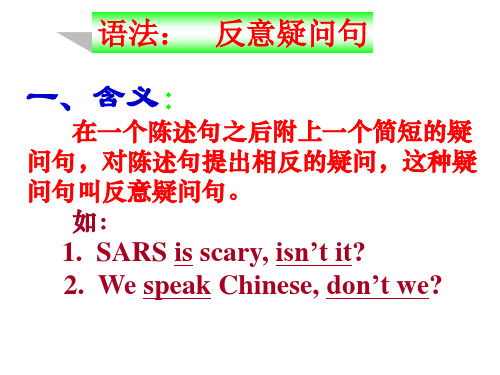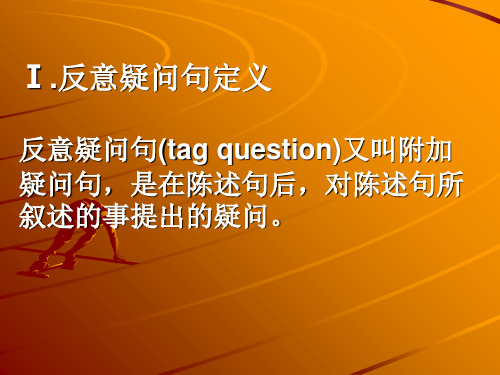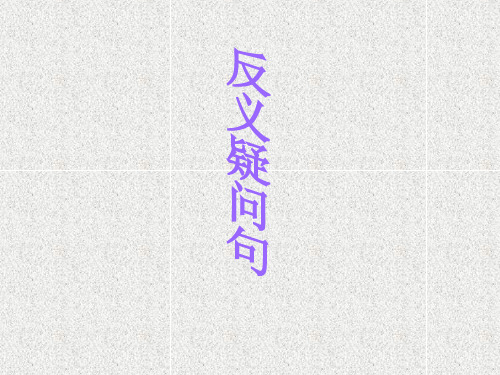反义疑问句课件(初中)3
合集下载
初中英语《反义疑问句》优质课件

11) 感叹句中,疑问部分用be +主语。 What colors, aren't they?
12) 陈述部分由neither… nor, either… or 连接的并列主语时, 疑问部分 根据其实际逻辑意义而定。 Neither you nor I am engineer, are we?
9) You'd like to go with me, _w_o_u_l_d_n_'t_y_o_u_? 10) He must be a doctor,__is_n_'t_h_e____?
或 usedn't + 主语。
He used to take pictures there, didn't he? / usedn't
he? 7) 陈述部分有had better + v. 疑问句部分用hadn't you?
You'd better read it by yourself, hadn't you? 8) 陈述部分有would rather +v.,疑问部分多用 wouldn't +主语。
He said he wanted to visit Japan, didn't he? c. 上述部分主句谓语是think, believe, expect, suppose, imagine等引导
的宾语从句(尤其当主句主语是第一人称时),疑问部分与宾语从句 相对应构成反意疑问句。
I don't think he is bright, is he?
15) Everyone knows the answer, don't they? (does he?)
12) 陈述部分由neither… nor, either… or 连接的并列主语时, 疑问部分 根据其实际逻辑意义而定。 Neither you nor I am engineer, are we?
9) You'd like to go with me, _w_o_u_l_d_n_'t_y_o_u_? 10) He must be a doctor,__is_n_'t_h_e____?
或 usedn't + 主语。
He used to take pictures there, didn't he? / usedn't
he? 7) 陈述部分有had better + v. 疑问句部分用hadn't you?
You'd better read it by yourself, hadn't you? 8) 陈述部分有would rather +v.,疑问部分多用 wouldn't +主语。
He said he wanted to visit Japan, didn't he? c. 上述部分主句谓语是think, believe, expect, suppose, imagine等引导
的宾语从句(尤其当主句主语是第一人称时),疑问部分与宾语从句 相对应构成反意疑问句。
I don't think he is bright, is he?
15) Everyone knows the answer, don't they? (does he?)
中考复习--反义疑问句PPT优秀课件

中考复习--反义疑问句PPT优秀课件
中考复习--反义疑问句PPT优秀课件
2.感叹句
其反意疑问句常根据其主、谓语来确定。
• ①How time flies, doesn’t it? • ②How tall the buildings are, aren’t they? • ③How hard it’s raining, isn’t it? • ④What a tall man, isn’t he? • ⑤What tall buildings, aren’t they?
中考复习--反义疑问句PPT优秀课件
中考复习--反义疑问句PPT优秀课件
句型2: 其它形式的祈使句, will you(表示请求) 或won’t you(表示提醒)?
①Come into the classroom, will you? ②Please be careful, will you? ③Be quick, will you? ④Don’t be late again, will you? ⑤Do it at once, will you? ⑥Let me have a try, will you? ⑦Let us leave now, will you?
中考复习--反义疑问句PPT优秀课件
中考复习-反义疑问句PPT优秀课件
四、特殊词类做主语的反意疑问句
2. 指示代词 • ①陈述部分的主语是指示代词this或that时,
反意疑问句的主语用it • This is a plane, isn’t it? 这是一架飞机,是
吗? • ②当陈述部分的主语是指示代词these或
2. The students must study hard, mustn’t they?
中考复习--反义疑问句PPT优秀课件
2.感叹句
其反意疑问句常根据其主、谓语来确定。
• ①How time flies, doesn’t it? • ②How tall the buildings are, aren’t they? • ③How hard it’s raining, isn’t it? • ④What a tall man, isn’t he? • ⑤What tall buildings, aren’t they?
中考复习--反义疑问句PPT优秀课件
中考复习--反义疑问句PPT优秀课件
句型2: 其它形式的祈使句, will you(表示请求) 或won’t you(表示提醒)?
①Come into the classroom, will you? ②Please be careful, will you? ③Be quick, will you? ④Don’t be late again, will you? ⑤Do it at once, will you? ⑥Let me have a try, will you? ⑦Let us leave now, will you?
中考复习--反义疑问句PPT优秀课件
中考复习-反义疑问句PPT优秀课件
四、特殊词类做主语的反意疑问句
2. 指示代词 • ①陈述部分的主语是指示代词this或that时,
反意疑问句的主语用it • This is a plane, isn’t it? 这是一架飞机,是
吗? • ②当陈述部分的主语是指示代词these或
2. The students must study hard, mustn’t they?
反义疑问句详细讲解课件(PPT27张)

I don’t believe he has finished his work.
7.当陈述部分的主句是I think (expect, believe)等结构时,反 意疑问句的附加部分则往往与从 句中的主语和谓语动词保持对应 关系,但要注意否定的转移。 例如:
I think he’s funny, isn’t he? I don’t believe she likes my
You must have seen the film last week, didn’t you?
6. 当陈述部分是I am…时,反意疑 问句部分通常要用aren’t I;如陈述 句部分的主语是I am not时,反意疑 问句部分通常要用am I。 例如:
1)I am a teacher, aren’t I?
Ⅰ.反意疑问句定义
反意疑问句(tag question)又叫附加 疑问句,是在陈述句后,对陈述句所 叙述的事提出的疑问。
Ⅱ.基本结构:
陈述句+逗号+简短的一般疑问句?
遵循前肯定后否定前否后肯式的原则
①前肯后否式。例如:
You are all students, aren’t you﹖
②前否后肯式。例如:
Let’s have a rest, shall we? 以let us开头的祈使句,不包括 说话人在内,因此反意疑问句的 附加部分用will you。例如:
Let us stop now, will you?
Ⅳ. 反意疑问句的回答 “ 根据事实回答”
对反意疑问句的回答,无论问题的提法如何,如果 事实是肯定的,就用yes,事实是否定的,就要用no。 要特别注意陈述句部分是否定结构,反意疑问句部分 用肯定式提问时,回答yes或no与汉语正好相反。这 种省略回答的yes要译成“不”,no要译成“是”。
7.当陈述部分的主句是I think (expect, believe)等结构时,反 意疑问句的附加部分则往往与从 句中的主语和谓语动词保持对应 关系,但要注意否定的转移。 例如:
I think he’s funny, isn’t he? I don’t believe she likes my
You must have seen the film last week, didn’t you?
6. 当陈述部分是I am…时,反意疑 问句部分通常要用aren’t I;如陈述 句部分的主语是I am not时,反意疑 问句部分通常要用am I。 例如:
1)I am a teacher, aren’t I?
Ⅰ.反意疑问句定义
反意疑问句(tag question)又叫附加 疑问句,是在陈述句后,对陈述句所 叙述的事提出的疑问。
Ⅱ.基本结构:
陈述句+逗号+简短的一般疑问句?
遵循前肯定后否定前否后肯式的原则
①前肯后否式。例如:
You are all students, aren’t you﹖
②前否后肯式。例如:
Let’s have a rest, shall we? 以let us开头的祈使句,不包括 说话人在内,因此反意疑问句的 附加部分用will you。例如:
Let us stop now, will you?
Ⅳ. 反意疑问句的回答 “ 根据事实回答”
对反意疑问句的回答,无论问题的提法如何,如果 事实是肯定的,就用yes,事实是否定的,就要用no。 要特别注意陈述句部分是否定结构,反意疑问句部分 用肯定式提问时,回答yes或no与汉语正好相反。这 种省略回答的yes要译成“不”,no要译成“是”。
中考英语-反义疑问句PPT(共46张PPT)

1.反义疑问句 Question Tags
A.目的:我们使用反义疑问句来确认某件事是否是真实的, 或者期望得到对方的肯定回答。
B.构成:陈述部分+附加疑问部分
C.规则: 1.附加疑问部分构成: 由谓语动词的正确形式(be,do ,情态动词)+主格代词 (he,they,it等) 2.时态 陈述部分与附加疑问部分时态保持一致
3) 关于陈述部分的主语和疑问 部分的主语一致问题
陈述部分主语
不定代词everyone,no one, nobody everything,anything,nothing,som ething, this,that one
疑问部 分主语
he/they
it one/he
例句
Everyone is in the classroom, aren't they? Everything goes well, does it? This is your book, isn't it? One can't be always young,can one?
now,_________? 4.It's a nice day,______? 5.Arthur is responsible for the newspaper, ____? 6.Alice has never seen a three-D movie at the cinema,
_______?
动词 + there
There are some apples in the basket, aren't there? There isn't any milk left, is there?
A.目的:我们使用反义疑问句来确认某件事是否是真实的, 或者期望得到对方的肯定回答。
B.构成:陈述部分+附加疑问部分
C.规则: 1.附加疑问部分构成: 由谓语动词的正确形式(be,do ,情态动词)+主格代词 (he,they,it等) 2.时态 陈述部分与附加疑问部分时态保持一致
3) 关于陈述部分的主语和疑问 部分的主语一致问题
陈述部分主语
不定代词everyone,no one, nobody everything,anything,nothing,som ething, this,that one
疑问部 分主语
he/they
it one/he
例句
Everyone is in the classroom, aren't they? Everything goes well, does it? This is your book, isn't it? One can't be always young,can one?
now,_________? 4.It's a nice day,______? 5.Arthur is responsible for the newspaper, ____? 6.Alice has never seen a three-D movie at the cinema,
_______?
动词 + there
There are some apples in the basket, aren't there? There isn't any milk left, is there?
反义疑问句(共14张PPT)全

二、前否+后肯
1.She wasn’t ill last week, was she ? 2.It doesn’t often rain here, does it? 3.Tom won’t go to Shanghai next year,
will he ?
特殊用法1—祈使句的反义疑问句
1、肯定祈使句的反意疑问句,疑问部分用will you或won’t you,否定祈使句则用will you ? 如: Don't do that again, will you? Go with me, will you / won't you?
13、He who seize the right moment, is the right man.谁把握机遇,谁就心想事成。2024/10/172024/10/172024/10/172024/10/1710/17/2024 +14、谁要是自己还没有发展培养和教育好,他就不能发展培养和教育别人。2024年10月17日星期四2024/10/172024/10/172024/10/17 +15、一年之计,莫如树谷;十年之计,莫如树木;终身之计,莫如树人。2024年10月2024/10/172024/10/172024/10/1710/17/2024 +16、教学的目的是培养学生自己学习,自己研究,用自己的头脑来想,用自己的眼睛看,用自己的手来做这种精神。2024/10/172024/10/17October 17, 2024 +17、儿童是中心,教育的措施便围绕他们而组织起来。2024/10/172024/10/172024/10/172024/10/17
一 、前肯+后否 含be动词
1.He is a doctor, isn’t he? 2.I am Chinese, aren’t I?
中考英语复习专题反义疑问句课件(共32张PPT)

后
肯
1、简短问句的 主语用人称代词,不用名 词,并要与陈述句的 主语保持一致,同时 前后两部分的助动词、情态动词、动词在 人称、数、时态上要保持一致。
Tom is a good boy , isn’t he ? Tom is a good boy ,isn’t Tom ?
×
×
2、否定疑问句中的not要采用缩写形式
aren’t they They are good at singing , ___________?
Yes, they are.
They sang songs in GZ yesterday, didn’t _________? they No, they didn’t. They come from China, _________? don’t they Yes, they do.
1. 陈述部分的主语是this, that 或v.ing时, 疑问部分的主语多用it;陈述部分的主语是 these, those时,疑问部分的主语多用they。 This is a dictionary,_______ isn’t it? Those are sheep, ________ aren’t they?
It’s cold in the picture,___________? isn’t it Yes,it is.
不论怎样提问,若事实是肯 定的,就用yes回答;若事 实是否定的,就用no回答
do they They don’t like swimming,_________? Yes,they do. 不,他们喜欢
一般情况:肯定句+否定疑问句
前 肯 后 否
否定句+肯定疑问句
前否
后 肯
初中英语《反义疑问句》优质课件

)?eh seod( ?yeht od ,ti tuoba swonk ydoboN )?eh seod( ?yeht t'nod ,rewsna eht swonk enoyrevE 。eh数单用也时有�yeht数复用常分部问疑�等 eno on ,ydobon ,ydobemos ,enoyna ,ydobyreve词代定不是语主分部述陈 )51 ?ehs t'nac ,retteb ti od nac ehs eveileb eW ?eh si ,thgirb si eh kniht t'nod I 。句问疑意反成构应对相 句从语宾与分部问疑�)时称人一第是语主句主当其尤(句从语宾的 导引等enigami ,esoppus ,tcepxe ,eveileb ,kniht是语谓句主分部述上 .c ?eh t'ndid ,napaJ tisiv ot detnaw eh dias eH ?eh si ,klat a su evag ohw nam eht ton si eH �定而语 谓的句 主据根语谓分部问疑�句合复从主的句从语宾�句从语定有带 .b ?eh t'ndluohs , neht anihC ni neeb evah dluohs eh ;semit lareves rof gnijieB ot neeb dah htimS .rM 。定而语谓的句从近邻据根词动语谓�分部问疑句合复列并 .a �况情种三有分部问疑�句合复列并或句从语主为分部述陈 )41 ?ti t'nsi ,ydaer si gnihtyrevE 。ti用语主分部问疑 ,siht ,gnihton ,taht ,gnihtyreve词代定不或词代示指是语主分部述陈 )31
?eh t’ndluohs ?eh t'nthguo ,od ot tahw wonk ot thguo eH .)4 ? yeht od ,)花开( nwolb reven stnalp emoS .)3 ?I yam ,uoy htiw drow a evah ot hsiw I .)2 ?I t'nera�retsis ruoy sa llat sa m'I .)1
《反义疑问句》课件

提供一些实际例子,引导听众分析和理解反义疑问句的适用场景。
2
练习及反馈
设计题目供听众练习反义疑问句的运用,并提供实时反馈和解析。
结语
反义疑问句的重要性和使用 价值
总结反义疑问句在语言表达中的重要性和应 用价值。
希望大家能够运用反义疑问 句更好地沟通交流。
什么是反义 疑问句?
解释反义疑问句的 定义和作用,引起 听众的兴趣和好奇。
反义疑问句 的组成结构
解析反义疑问句的 构成要素,加深理 解和记忆。
反义疑问句 的附加疑问 部分形式
介绍反义疑问句中 常见的附加疑问部 分形式,提供实例 加深印象。
反义疑问句 的特点与注 意事项
探讨反义疑问句的 独特特点和注意事 项,帮助听众正确 运用。
《反义疑问句》PPT课件
反义疑问句PPT课件,通过精心设计的幻灯片,详细阐述反义疑问句的基本 语法与使用场景,帮助大家更好地运用反义疑问句进行沟通交流。
概述
基本语法与特点
掌握反义疑问句的基本语法和特点,提高语 言表达的灵活性。
使用场景
了解反义疑问句的应用场景,拓宽交流和表 达的方式。
反义疑问句的基本语法与特点
反义疑问句的使用场景
常见的反义疑问句应用 场景
反义疑问句在交流中的 作用
列举常见的日常对话和情境, 逐一讲解如何使用反义疑问句。
阐述反义疑问句在有效沟通中 的作用和价值,引发思考和一些技 巧和注意事项,提高语言表达 的准确性。
练习与实践
1
反义疑问句实例分析
反意疑问句ppt课件

Байду номын сангаас
7. 祈使句的反意疑问句
祈使句, will you ?
1 Don’t be late, __w_il_l _yo_u_____? 2 Have a rest, ___w_i_ll _y_o_u___? 3 Speak louder, ___w_il_l _yo_u____? 4 Don’t wait for me, __w_i_ll_y_o_u__? 5 Let’s have a rest, __s_h_a_l_l w__e_____? 6 Let us have a rest, ___w_i_ll_y_o_u_____?
4. 完成时的反意疑问句
主语+have/has+过去分词…, haven’t (hasn’t) + 主语?
1 You have heard of him,h_a_v_e_n_’_t _y_o_u_____? 2 He has been to America, _h_a_s_n_’_t _h_e______? 3 Marry hasn’t lived in the countryside, __h_a_s__s_h_e______? 4 You haven’t been to Shanghai, __h_a_v_e__y_o_u_? 5 They have never been to Hong Kong, __h_a_v_e__th_e_y_____?
1 Tom can swim very well, _c_a_n__’t_h_e___? 2 Your parents can’t swim, __c_a_n_t_h_e_y____? 3 All of your friends will come to your party, _w__o_n_’t_t_h_e_y__? 4 They won’t come,_w_i_ll_t_h_e_y__?
7. 祈使句的反意疑问句
祈使句, will you ?
1 Don’t be late, __w_il_l _yo_u_____? 2 Have a rest, ___w_i_ll _y_o_u___? 3 Speak louder, ___w_il_l _yo_u____? 4 Don’t wait for me, __w_i_ll_y_o_u__? 5 Let’s have a rest, __s_h_a_l_l w__e_____? 6 Let us have a rest, ___w_i_ll_y_o_u_____?
4. 完成时的反意疑问句
主语+have/has+过去分词…, haven’t (hasn’t) + 主语?
1 You have heard of him,h_a_v_e_n_’_t _y_o_u_____? 2 He has been to America, _h_a_s_n_’_t _h_e______? 3 Marry hasn’t lived in the countryside, __h_a_s__s_h_e______? 4 You haven’t been to Shanghai, __h_a_v_e__y_o_u_? 5 They have never been to Hong Kong, __h_a_v_e__th_e_y_____?
1 Tom can swim very well, _c_a_n__’t_h_e___? 2 Your parents can’t swim, __c_a_n_t_h_e_y____? 3 All of your friends will come to your party, _w__o_n_’t_t_h_e_y__? 4 They won’t come,_w_i_ll_t_h_e_y__?
反义疑问句课件

They had to cross the busy street, didn’t they?
特殊用法11
陈述部分的谓语是used to 时,疑问部分用 didn't +主语或 usedn't +主语。
He used to take pictures there, didn't he?
She used to stay up late, usedn’t she?
---祈使句
1. Sit down please, _w__il_l_/_w__o_n_’_t _y_o_u_ ? 2. Please call me, __w_i_ll__/ _w_o_n__’t_y__o_u__? 3. Let’s go home, _s_h_a__ll_w__e________ ? 4. Let us go home, _w__il_l_/_w__o_n_’_t _y_o__u_ ? 5. Don’t leave now, __w_i_ll_y_o__u________?
反义疑问句
(The tag question)又叫附加疑 问句。它表示提问人的看法,没 有把握,需要对方证实。
反意疑问句由“陈述句+简略疑问句”两部分组成,第一部分 提出一种看法,第二部分用来质疑或表示证实。附加疑问句 部分常为:be动词/助动词/情态动词+主语
反意疑问句/ 附加疑问句--规则: 陈述句+附加问句
He would rather read it ten times than recite it, wouldn't he?
特殊用法14
陈述部分有You'd like to + v. 疑问部分用wouldn't +主语。
特殊用法11
陈述部分的谓语是used to 时,疑问部分用 didn't +主语或 usedn't +主语。
He used to take pictures there, didn't he?
She used to stay up late, usedn’t she?
---祈使句
1. Sit down please, _w__il_l_/_w__o_n_’_t _y_o_u_ ? 2. Please call me, __w_i_ll__/ _w_o_n__’t_y__o_u__? 3. Let’s go home, _s_h_a__ll_w__e________ ? 4. Let us go home, _w__il_l_/_w__o_n_’_t _y_o__u_ ? 5. Don’t leave now, __w_i_ll_y_o__u________?
反义疑问句
(The tag question)又叫附加疑 问句。它表示提问人的看法,没 有把握,需要对方证实。
反意疑问句由“陈述句+简略疑问句”两部分组成,第一部分 提出一种看法,第二部分用来质疑或表示证实。附加疑问句 部分常为:be动词/助动词/情态动词+主语
反意疑问句/ 附加疑问句--规则: 陈述句+附加问句
He would rather read it ten times than recite it, wouldn't he?
特殊用法14
陈述部分有You'd like to + v. 疑问部分用wouldn't +主语。
演示文稿反义疑问句初中课件

• 3.There will not be any classes tomorrow,
_w__il_l_t_h__e_r_e______There wasn’t anything new on TV last night,
_w__a_s__th__e_r_e___? Yes, there was a new TV play. It
• 2. You haven’t been to the U. S. , have you? __N_o_,_I_h_a_v_e_n_’_t_.__. I want to have a visit one day. ____Y_e_s_, _I_h_a_v_e_.__. I have been there three times.
Yes, it did.
第十页,共24页。
Liu Xiang won the hurdle race again, ___d_id_n_’t_h?e
Yes, he did.
第十一页,共24页。
There was a heavy snow last year, _w__as_n_’t_t_h_e_re?
须一致。(注意中文和英文思维的差异)
• 1. The book isn’t so boring, is it? _____Y_e_s_, _it_i_s_. ___. It’s the worst book I have ever read. ____N_o_,_it_i_s_n_’t_.___. It’s fun, I think.
4. Let us go home, __w_i_ll_/__w_o_n__’t__y_o_u_ ? 5. Don’t leave now, __w__il_l_y_o__u_______?
相关主题
- 1、下载文档前请自行甄别文档内容的完整性,平台不提供额外的编辑、内容补充、找答案等附加服务。
- 2、"仅部分预览"的文档,不可在线预览部分如存在完整性等问题,可反馈申请退款(可完整预览的文档不适用该条件!)。
- 3、如文档侵犯您的权益,请联系客服反馈,我们会尽快为您处理(人工客服工作时间:9:00-18:30)。
The students were in the classroom,weren’t they ________? Yes, they were.
were they They weren’t in the zoo last Sunday, _______?
No, they weren’t. They went to the mountains.
反意疑问句/ 附加疑问句--陈述句+附加问句 规则: 1. 前肯,后否; 2. 前否,后肯; 3. 附加问句和陈述句人称、时态一 致(相应时态的助动词的肯定/ 否定形式+人称代词)。
1. 前肯,+ 后否
be 动词:
aren’t you 1. You are an actor, ________ _____ ? 2. He is a good boy, ________ ______ ? isn’t he 3. It was fine yesterday, _______ ___ ? wasn’t it 4. You were studying when I called weren’t you you last night, __________ _____ ? 5. She is going to visit me, _____ ____? isn’t she 6. I am Chinese, ______ ______? aren’t I
特殊用法1 ---祈使句的反意疑问句:
在祈使句后面附加问句,以加强语气或使祈使 句听起来较委婉、客气。附加问句可选用 “will you? ”“won’t you?”。 祈使句为否定结构时,附加问句一般只用 “will you?”. 陈述句为 “Let’s…” 结构时, 表示建议,其意思 包括对方,即“让我们(你我双方)”附加问句一 般用 “shall we?” 。 陈述句为 “Let us…” 结构时, 表示请求,其意 思不包括对方,即“你让我们…(You let us)”,附 加问句一般用 “will you?”
7. You won’t go to U.S.A., ______ ____? will you 8. There isn’t a boy in our classroom,
______ _______ ? is there 9. There weren’t many cars in the street, _______ _______ ? were there will you 10. Don’t smoke, _______ _____ ? 11. Let’s do it, _______ _____ ? shall we
特殊用法5
回答反意疑问句的问题时,要注意根据事情情况回答.只 要事实是肯定的,就用Yes回答,如果事实是否定的,就 用No回答,不管第一部分句子是肯定或否定。Yes/ No 和 之后的简略回答必须一致。(注意中文和英文思维的差异)
• 1. The book isn’t so boring, is it? Yes, it is. _______________. It’s the worst book I have ever read. No, it isn’t. _______________. It’s fun, I think. • 2. You haven’t been to the U. S. , have you? No, I haven’t. _______________. I want to have a visit one day. Yes, I have. _______________. I have been there three times.
特殊用法6 主语是everyone, someone, anyone, no one, nobody等 不定代词时,反意疑问句的主语一般用they指代。
• 1.Everyone in your family is fond of ห้องสมุดไป่ตู้wimming, aren’t they ? 你们全家都喜欢游泳,是吗? can’t they • 2.Anyone can do that, ___________? aren’t they • 3.Someone is knocking at the door, __________? don’t they • 4.No one knows about it, __________?
特殊用法3---There be句型的反意疑问句。
陈述句为There be结构时,附加问句仍用there。
• 1.There is a famous doctor in your hometown, isn’t there ______________? Yes, there is. • 2.There are many visitors in Beijing now, aren’t there __________________? • 3.There will not be any classes tomorrow, will there _________________? No, there won’t. • 4.There wasn’t anything new on TV last night, was there _____________? Yes, there was a new TV play. It was very interesting.
特殊用法7 主语是everything, something, anything, nothing等不 定代词时,反意疑问句的主语一般用it指代。
• 1.Nothing is important for him, is it? • 2.Something is wrong with your computer, isn’t it ______________? isn’t it • 3.Everything is ready for the test, __________? 一切都准备好了,对吗?
其它动词:
1. You will go to America, ______ ___ ? won’t you 2. We have ever been to Shanghai, _________ ______ ? haven’t we
2. 前否,+ 后肯 1. You aren’t an actor, ______ ____ ? are you 2. He isn’t a good boy, ______ _____ ? is he 3. It wasn’t fine yesterday, ____ ____ ? was it 4. It doesn’t rain here, ______ ____ ? does it 5. His sister doesn’t have a headache, ________ _____ ? does she 6. You didn’t call me yesterday, did you _______ _____?
Unit 10 It's a nice day, isn't it? tag questions
isn’t it It’s cold ,___________? Yes,it is.
They are playing football, aren’t they?
Yes, they are.
do they They don’t like swimming,_________? No, they don’t. They enjoy it a lot.
will you 5. Don’t leave now, ________________?
特殊用法2 情态动词的反义疑问句
陈述句+情态动词的简短否定/ 肯定+主语? • 1) He can play the piano,_________? can’t he
shouldn’t he • 2) He should go right now, __________? can they • 3)They can’t finish it, ___________?
didn’t it It rained heavily yesterday, _______? Yes, it did.
didn’t he Liu Xiang won the hurdle race again, _______? Yes, he did.
wasn’t there There was a heavy snow last year, _________? Yes, there was.
特殊用法4
陈述部分如果有否定意义的词,如:hardly(几乎 不), never(从不), nothing, few, little, no, seldom(很 少), too…to(太…以至于不能) 等, 这时疑问部分要 用肯定形式。
• 1.Mr. Smith can hardly speak Chinese, can he ________? • 2.She has never been to Hong Kong,has she ___________? • 3.There is nothing important in the newspaper, is there ______________? do they • 4.Few people eat wild animals now, __________? does he • 5.He knows little German, ____________ ? • 6.You have seldom met him recently, ________? have you is he • 7.He is too young to join the army, ___________?
